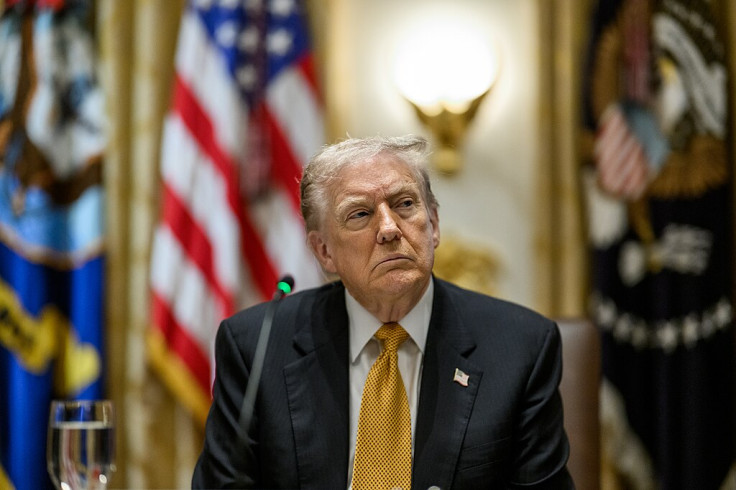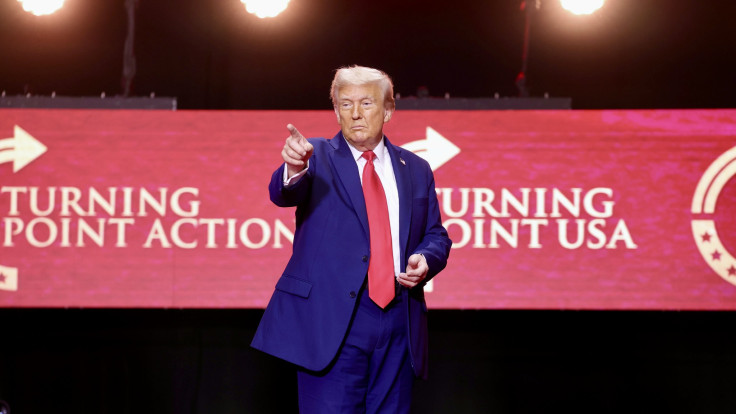Donald Trump 'Looked Hurt' As NFL Crowd Booed And Flipped Him Off
The episode came amid reports that Trump has privately expressed an interest in having the Commanders' planned new stadium bear his name

Donald Trump's appearance at the Washington Commanders game provoked a chorus of boos and obscene gestures that left the president visibly rattled and highlighted the fraught intersection of politics, sport, and spectacle.
Trump attended the Commanders versus Detroit Lions match at Northwest Stadium on 9 November 2025, becoming the first sitting president to attend a regular-season NFL game since 1978. His arrival and on-screen appearances prompted loud jeers from many fans, and videos circulating on social media show some spectators making an obscene gesture while he stood in a suite with House Speaker Mike Johnson.
The episode came amid reports that Trump has privately expressed an interest in having the Commanders' planned new stadium bear his name, a claim that has inflamed an already combustible atmosphere.
Public Reaction On The Jumbotron
When Trump was shown on the stadium videoboard late in the first half, boos erupted across sections of the crowd. The AP reported that the jeering continued during a halftime enlistment ceremony when Mr Trump read an oath for service members on the field.
Video clips, shared widely on X and uploaded to YouTube, capture sustained boos and at least one clear middle-finger gesture from a fan in the stands. The visuals circulated rapidly online, fuelling debate about whether sports arenas remain an appropriate stage for political theatre.
BREAKING: Trump was just viciously BOOED at the Washington Commanders Detroit Lions game.
— Brian Krassenstein (@krassenstein) November 9, 2025
I’ve never heard a president booed this loudly in my life. Holy cow! pic.twitter.com/leRnDUOtbv
Spectators interviewed outside the stadium offered mixed reactions. Supporters who voiced displeasure at the crowd's response argued that booing a president during a military ceremony was disrespectful to service personnel.
Others, and many social-media commentators, framed the reaction as an expression of civic dissent, noting Trump's polarising figure and his recent entanglement with the Commanders over their stadium and naming rights.
The President's Remarks And The Stadium Row
Trump arrived via Air Force One and told reporters at Joint Base Andrews, 'I'm a little bit late,' before adding, 'We're gonna have a good game. Things are going along very well. The country's doing well. The Democrats have to open it up,' a reference to the ongoing government shutdown at the time.
His comments, carried by the AP and other outlets, were routed into the wider narrative about his public posture and the optics of attending a sporting fixture during a tense political standoff.

The background to the visit includes an explosive report that Trump has sought to have the Commanders' new stadium named after him, a proposed £2.8 billion ($3.7 billion) development, according to coverage of the story.
Multiple outlets citing sources told the ESPN report that a 'senior White House source' or intermediary had communicated the president's wish to team ownership; the White House press office responded by calling such an outcome 'beautiful'. Any renaming would, however, require the approval of local authorities and federal land managers.
@rrosaaj Trump bood at the Washington Comanders game. The crowd did not disappoint 😂😂 #trump #washingtondc #commanders #detroitlions #washingtoncommanders #northweststadium #boo #fucktrump
♬ original sound - rrosaaj
Politics On The Field
The incident underscores the persistent politicisation of US sporting culture since 2016, when national-anthem protests first made players' expressions of dissent a national story. Trump's relationship with the NFL has been complicated for years, alternating between public criticism of player protests and high-profile engagements with league executives.
His visible presence at the Commanders game, and the crowd's vocal reaction, illustrated how stadiums remain both entertainment venues and civic forums where public sentiment is loudly displayed.
@be__radical Donald Trump gets booooooooooed at the Washington Commanders game
♬ sonido original - user69314024372
Players, commentators, and pundits reacted in real time. Some players adopted light-hearted references to Mr Trump during celebrations, while broadcasters and social-media commentators parsed whether the boos were widespread or confined to particular sections.
Trump, visibly affected by the reception, left before the game finished. Observers on both sides of the debate suggested the moment was emblematic: whether seen as humiliation or free expression, it underlined how contemporary American sport can become a mirror for the nation's divisions.
The boos at the Commanders game were not merely noise; they were a public barometer of the political temperature in the United States.
© Copyright IBTimes 2025. All rights reserved.





















